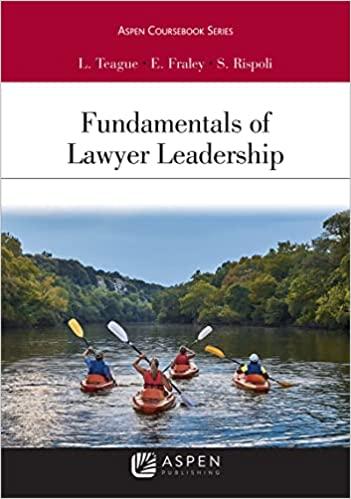Question
1.The court will make a rebuttable presumption that in social or family arrangements there is always an intention to create legal relations 2.Unlike the position
1.The court will make a rebuttable presumption that in social or family arrangements there is always an intention to create legal relations
2.Unlike the position in Civil Law Countries there must be consideration present if an agreement is tolegally enforceable in a Common Law country
3.Law in Common Law countries developed mainly from written Roman Law established when the Roman Empire ruled the land around the Mediterranean Sea.
4.Separation of powers involves government, Parliament, and the judiciary whereby power is distributed between all three entities to avoid too much power to be held by any one of them, essentially to avoid excessive State control over citizens
5.No building contact is legally enforceable unless it is written
6.Terms of a contract can be made expressly or impliedly
7.If an agreement is made between two parties in which one party will pay money for the other party'sperformance of its obligations, it must be a legally enforceable contract
8.The element of "consideration" in a contract means that the parties have thought about it and have considered their intentions under the agreement
9.Capacity to contract concerns a party's mental ability to be able to know what they are doing when making a contract for example by reason of age or mental state, either permanent or temporary, so is not possible to make a legally binding contract after taking drugs
10.The need for consideration to form a legally binding contract is a creation of the Common Lawsystem but is not a requirement of the Civil Law system
11.Certain elements are common to all contracts but a lot of contracts by reason of frequent andrepetitive use develop specific features, and specific legislation covers construction contracts
12.A builder agreed to make extensive renovations and structural alterations to a homeowner's house and they both agreed not to apply to the consenting authority for a building consent as it was unlikelythat one would be given; this was still a legally binding contract if a price for the work had beenagreed because parties are free to enter into any agreement for any price they agree to
13.A tort is a 'wrong' which when committed by someone [a tortfeasor] gives the person harmed by ita right to take action, for example the tort of trespass by placing building materials used to build a house on an adjacent section without the owner's permission would entitle the owner to have thematerials removed and receive compensation for any damage caused
14.Whether a person is liable to another person for the consequences of his/her/its negligence depends on whether in such circumstances the Court has found that s/he owes a duty of care to that person
15.A person can be held concurrently liable for both a breach of contract and in the tort of negligence
16.A professional indemnity insurance policy bears the costs of defending an action against the policy holder for his/her negligence plus the cost of damages if it is proven that s/he was negligent
17.Because a design is defective does not mean it was negligent, e.g. the state of industry knowledge when it was designed was such that it was believed to be satisfactory
18.A builder is in a difficult position when told to follow a design the builder thinks is faulty because unless the builder makes it clear it only does so on the basis that the building owner indemnifies the builder against any adverse consequences of doing so, otherwise when problems arise, the builder may be held responsible for proceeding according to a design it knew was defective
19.An agent is someone who acts for a principal and can bind the principal by his/her actions, forexample the supervisor on a building site acts as agent for the building company employing him/her and can agree to do extra work on its behalf
20.If an agent acts beyond the authority the principal gives him/her but it appears to a third party that s/he is acting correctly, then the agent's actions do not bind the principal
21.The instructions a principal gives to an agent to act for him/her are a warrant of authority
22.In a business partnership each partner acts as agent for every other partner as his/her principal which is why each one is responsible for the torts committed by any other partner when it appears s/he has acted according to the business conducted by the partnership e.g. a firm of architects inwhich one partner negligently designs a defective building and the other partners are also liable for the consequences
- Please help me decide whether these are true or false
Step by Step Solution
There are 3 Steps involved in it
Step: 1

Get Instant Access to Expert-Tailored Solutions
See step-by-step solutions with expert insights and AI powered tools for academic success
Step: 2

Step: 3

Ace Your Homework with AI
Get the answers you need in no time with our AI-driven, step-by-step assistance
Get Started


